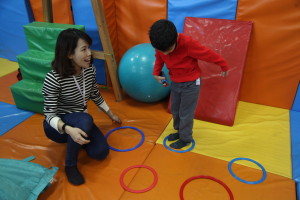We asked some of our special education experts in our full time program, the Innovative Learning Center, to tell us what approaches work for them in their work. Below are their answers.
1. Be Consistent.
“It’s very important to be consistent with the goals you set up, but not to be afraid of changes or dealing with challenges. In working with the kids, if any new difficulties come up we have to be able to work through it, to consult with the specialists’ team, look at it in a broader perspective so we can help the child.” – Alice Wen, Early Intervention Program Leader (Puxi) and Occupational Therapist
2.Empathize constantly.
“Think from the child’s perspective. When I first started doing this job, my first reaction when I saw a child crying was to tell them to stop. Now instead I stop and think why they are upset. I help them express their feelings so they can get what they want. We help the children help themselves.” – Han Xiong, Educational Psychologist at the Innovative Learning Center
3. Follow the child’s lead.
“I think it’s really important to follow the child’s lead. It sounds strange when you’re talking about a child who has cognitive problems, what leads can they be providing? But the more you get to know a child the more you notice their preferences and the more you can appeal to them. Establish a connection with them and you will be able to teach them.” Robin Shepard, Early Intervention Program Leader (Pudong)
4. Be patient.
“Be patient. Because children with special needs take more time to learn skills, you need to be very understanding and aware of their limitations. You need be thoughtful and observe carefully all the time.” – Chantal Chen, Occupational Therapist at the Innovative Learning Center
5. Create an accepting environment.
“Make the children feel that they are accepted for who they are. It’s important that they have a setting where what they say and do is not met with prejudice. A place where how you feel can be discussed and explored. A place where no one asks, ‘Why are you so weird?’” – Patrick Hoffmann, Program Assistant in our Life Skills program
6. Foster trust.
“Encourage the child to trust you by using visual schedules and predictable, predetermined routines. I agree that being consistent helps a lot.” Amihan Tayag, Speech-Language Pathologist at the Innovative Learning Center
7. Show that you care – and keep it fun!
“I like to be fun and silly with them. And they love it. I think if you really care about them, you need to show that you care. If they bump their head, which sometimes happens, you have to show you are there for them.” – Tiffany Liang, Program Assistant in our Academic Program
“I agree. You have to be patient, you have to be warm, ensure that you show you care. Most importantly, you have to enjoy working with the children. You have to find the fun in the daily routine.” – Alice Wen, Early Intervention Program Leader (Puxi) and Occupational Therapist







